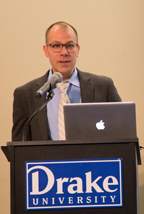 Timothy Knepper is professor of philosophy and chair of the Department of Philosophy and Religion at Drake University. We invited him to answer the question “What does philosophy of religion offer to the modern university?” as part of our “Philosophers of Religion on Philosophy of Religion” series.
Timothy Knepper is professor of philosophy and chair of the Department of Philosophy and Religion at Drake University. We invited him to answer the question “What does philosophy of religion offer to the modern university?” as part of our “Philosophers of Religion on Philosophy of Religion” series.
Specifying what philosophy of religion has to offer to the modern university requires understanding what philosophy of religion is. For the purposes of this short essay, I take philosophy of religion to be the understanding and evaluation of religious reason-giving. The first part of this formula—understanding and evaluation—is shorthand for my fourfold method and goals for doing philosophy of religion: (1) thick description, yielding empathetic and contextual understanding; (2) formal comparison, producing important and interesting similarities and differences; (3) multi-disciplinary explanation, giving reasons for the similarities and differences produced by the comparison; (4) crucial evaluation, raising traditional philosophical questions about the meaning, value, and truth of the form of religious reason-giving in comparative perspective. The second part of my formula—religious reason-giving—embeds two chief assumptions: first, that philosophy of religion investigates actual instances of religious reason-giving, not ahistorical generalities; second, the philosophy of religion investigates religious reason-giving in all religious traditions and communities, or at least in a cultural and religious diversity of religious traditions and communities.
Not only does specifying what philosophy of religion has to offer to the modern university presuppose an understanding of philosophy of religion; it also presupposes an understanding of the modern university. For better or worse, I have taught at only one university, Drake University, a mid-sized, private university in the Midwest. My department is a joint philosophy and religion department, offering undergraduate degrees only in philosophy and religion. My understanding of the modern university is formed by my experiences at Drake, especially Drake’s mission, which is “to provide an exceptional learning environment that prepares students for meaningful personal lives, professional accomplishments, and responsible global citizenship.”
For me, philosophy of religion’s contribution to the third of these aspirations—responsible global citizenship—is most obvious. Philosophy of religion offers empathetic and contextual understanding of the reasons and ideas that a cultural-religious diversity of religious traditions and communities give and use to understand who they are and how to live their lives. Philosophy of religion, at least as I practice it, helps students come to see these reasons and ideas as constituting living worldviews that make claims about what is real, true, and good. Moreover, such a philosophy of religion wrestles with issues regarding how people of different religious realities, truths, and values coexist peacefully and respectfully in a “global world.” For all these reasons, philosophy of religion plays a unique and indispensable role in the modern university’s goal of educating responsible global citizens.
For many philosophers of religion, philosophy of religion’s most unique and indispensable contribution to the modern university, at least in terms of Drake’s mission, involves meaningful personal lives. Philosophy of religion’s contribution to this goal is indeed important; for it is in philosophy of religion classes that students reflect in rigorous and disciplined ways about questions regarding their own religious beliefs and practices, or lack thereof. Unfortunately, though, traditional philosophy of religion often remains aloof to the reasons that religious practitioners actually employ in their religious lives, preferring instead the reasons of the western philosophical canon. If philosophy of religion were to take these everyday, ordinary reasons more seriously, it could potentially have an even greater impact in cultivating meaningful personal lives in its students in the modern university.
Finally, there is professional accomplishments. Of course, philosophy of religion contributes to the professional accomplishments of students pursuing philosophy of religion. Less obviously, philosophy of religion contributes to the professional accomplishments in religious studies and philosophy, although there are scholars of religion and philosophers who would no doubt argue differently. In the former case, philosophy of religion contributes an awareness of the nature and function of reason giving in religion, which is not nearly as attenuated as some scholars of religion want to believe. Moreover, philosophy of religion, at least as I understand it, takes up critical questions of method and theory in religious studies. In the latter case of philosophy, a philosophy of religion that pays attention to the historical forms of religious reason-giving could have the same kind of ripple effect as Thomas Kuhn had outside the philosophy of science and Ludwig Wittgenstein had outside the philosophy of language. Regardless, given that religion is something humans do, much like science and art, philosophy of religion can contribute to the philosopher’s quest to understand reason-giving and rationality more generally. But philosophy of religion is of use in the professional accomplishments of far more than just scholars of religion and philosophers. In many cases these contributions are no different than those of religious studies and philosophy more generally—critical thinking and analysis for lawyers and natural scientists, global and multicultural understanding for educators and social scientists. But philosophy of religion has a distinct contribution to professions that are somehow involved in religious reason-giving—fields related to anthropology, sociology, political science, international relations, psychology, and so forth.
If I have one concern about these contributions, it is not that philosophy of religion is unable in principle to make them, but that philosophy of religion is unwilling in practice to do so—that philosophy of religion is understood and practiced in such a way that it only considers the rationality of ahistorical theism or postmodern philosophy. It is time that philosophy of religion be understood and practiced much more globally and historically than this.
